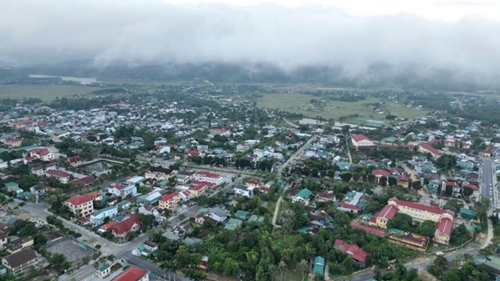During the resistance wars against the French colonialists and American imperialists, A Luoi served as a revolutionary base and suffered the devastating consequences of war. Many locations in the district are linked to the Vietnamese troops and peple’s heroic battles, such as Me oi Pass, Blood Stream, and A Bia Hill. In wartime, the people of ethnic communities stayed united, fought bravely, and served the revolution with resilience. In peacetime, they have joined efforts to rebuild their homeland, making it increasingly prosperous and beautiful.
The Ho Chi Minh Road, which runs through A Luoi, along with hundreds of kilometers of asphalt and concrete roads reaching even the most remote hamlets, has become a strong driver for the district's development. Spacious and solid houses are built, and the people have a strong desire to move forward.
    |
 |
|
A bird-eye view of A Luoi town, A Luoi district, Hue city |
Many ethnic minority households have boldly adopted the "garden-pond-livestock-forest" economic model, earning hundreds of millions of VND per year. For instance, in Quang Nham commune, models for growing medicinal herbs, such as abelmoschus sagittifolius, solanum procumbens, and black hybrid gac have shown remarkable effectiveness, helping over 100 households maintain stable incomes. A typical example is the family of Ho Van Tu in Pi Ay 1 village, Quang Nham commune. Starting with just 2 hectares of abelmoschus sagittifolius, after five years, he has expanded to 5 hectares. With stable yields and selling prices, his abelmoschus sagittifolius garden has helped the family escape poverty and enjoy a better life. “Growing abelmoschus sagittifolius yields 3–4 times higher income than other crops. This truly is a path for locals to change their lives,” said Tu.
As part of firs phase of the national target program on boosting the socio-economic development of ethnic minority-inhabited and mountainous areas (2021-2025) and the Medicinal Herb Development Plan (2021-2025), A Luoi district is implementing the “Investment and Support for Developing Valuable Medicinal Herb Regions” project with a total capital of VND 229 billion. The project is being carried out mainly in the communes of Hong Bac, Quang Nham, and others, focusing on precious medicinal plants, such as morinda officinalis, solanum procumbens, fallopia multiflora, adenosma glutinosum, abelmoschus sagittifolius, and homalomena occulta, among others. Irrigation systems and in-field canals are being comprehensively invested and solidified, ensuring water supply for agricultural production. Along with these efforts, Locals' farming and husbandry skills have been improved. The science and technology has been widely applied, significantly contributing to increasing agricultural productivity. Trades and services have also developed, creating more jobs and income for residents.
Vice Chairman of the A Luoi district People’s Committee Nguyen Van Hai said that thanks to the tireless efforts of the district’s Party Committee, authorities, and people, A Luoi has made notable development strides, with the poverty rate dropping sharply from 49.98% in 2021 to just 14.34% as of the end of 2024. The rural landscape has seen significant changes, and the people’s material and spiritual life has been improving. The district’s average per capita income has risen significantly, from VND 27.5 million in 2021 to over VND 40 million per year.
From a war-torn land, once one of the poorest districts in the country, A Luoi has made a remarkable leap forward, thanks to the care of the Party and State and the self-reliant spirit of the local Party Committee, authorities, and people. The effort paid off when the district was officially declared out of poverty by the Prime Minister on September 6, 2024.
Today's achievements are a testament to the unity and aspiration to move forward of the A Luoi people. With strong determination and steady progress, A Luoi is sure to continue achieving great success in its development journey, deserving to be a shining spot on the socio-economic map of Hue city, writing new chapters of glory in this revolutionary land.
Translated by Tran Hoai